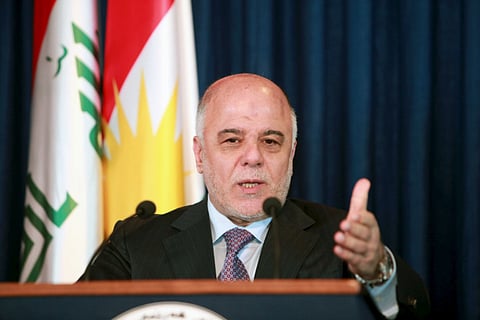Iraq’s unity faces many challenges
Iraqi government has to resort to hard and speedy operations against Daesh

There are no huge risks when sectarian alignments do not exceed the frameworks of political positions in a peaceful atmosphere, such as those experienced in Iraq during past years. However, sectarianism is an unhealthy and non-democratic phenomenon, where future risks that may threaten the security of the country and peace in the community are embedded in its folds.
As sectarian wars erupt into bloody clashes, the whole phenomenon goes beyond the geographic boarders of a given country, collapses its demographic balances and becomes a regional or even an international hazard in its size and scope. We have evidence of this when we review the national identities of Daesh (the self-proclaimed Islamic State of Iraq and the Levant) fighters in Iraq and Syria, who have come from all over the globe. The sectarian phenomenon in Iraq has become a milestone in the country’s political life. We find it in daily practices when decisions are made and when political elites take sides.
This sectarianism has also moved into a new phase with the beginning of the liberation operations in the Salah Al Deen province, superseding present sufferings towards greater concerns for what the future will hold. Military operations that took place in some provinces, the latest of which was in Salah Al Deen, were marred by many drawbacks related to abuses that should not have taken place during and after military operations to liberate areas under the control of Daesh.
Some of these disappointing practices were attributed to the popular militias participating in the battles. These abuses reveal the extent of hatred and desire for revenge rooted in the hearts of some. They also reveal the political dimension in the form of demographic change in the population map in some areas and the inability of official authorities to control the conduct of these militias — let alone the possibility of their lack of seriousness in confronting these militias.
The truth is that what emerged on the surface during the liberation of Salah Al Deen has become a source of concern to Iraqi and US officials alike. The US ceased its aerial support in the battle due to the role of the militias and the powers backing them. America returned to participate in the aerial support — along with the rest of its international coalition partners — only when the Iraqi leadership proceeded to pull out seven militia factions, as well as Iranian advisers from the city of Tikrit, because their presence raised the sensitivities.
Tikrit is, after all, Saddam Hussain’s city — the Iraqi leader who fought an eight-year war against the Iranians and all memories related to the former Iraqi regime are centred here.
We do not want to jump the gun and claim that emotions and sectarian practices after defeating Daesh will evaporate overnight. They are in fact deeply rooted in the minds of the militias. Moreover, the leaders of these militias will not abide by the rules and stop their followers from transgressions regarding the property and lives of others.
Moreover, countries supporting sectarian strife in Iraq for years will not cease these policies. However, Dr Haidar Al Abadi’s government is capable of controlling this mess and severing the strings of this lethal game. The future that worries us is closer than we think and for it not to become a source of continued concern as it is now, the Iraqi government has to take serious steps to amend the situation at hand.
The government has to resort to hard and speedy operational procedures to contain sectarian clashes, thus making them less bloody. It has to disarm the militias and decisively hold accountable all those hampering disarmament. Everyone has to adhere to the constitution, which stipulates that only the state has the right to arms.
In this context, the role of political elites that dominates the situation is focused on demonstrating their reliability and trust instilled in them by the Iraqi voters. These elites need to prove their keenness to promote Iraq’s unity, which is currently facing so many challenges. Otherwise, there is no future for Iraq save bloody wars and a divided country where everyone will end up paying a very heavy price.
If the stands taken by these elites — which pushed Iraq into a dark corridor — are the results of errors and not bad intentions then it is time for them to review their stands and amend them because Iraqis have suffered immensely as a result of their weak and erroneous leadership.
Finally, we must note that the deployment of resources in the military field to fight Daesh has not been matched by similar initiatives in the political field, which is definitely more important. Afterall, the Al Abadi government was formed in accordance with a deal that required operational procedures leading up to political reforms.
Mohammad Akef Jamal is an Iraqi writer based in Dubai.
Sign up for the Daily Briefing
Get the latest news and updates straight to your inbox


